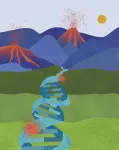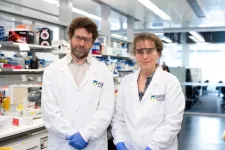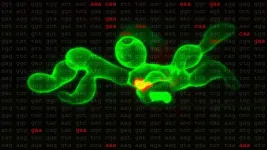(Press-News.org) HOUSTON ― Researchers at The University of Texas MD Anderson Cancer Center have uncovered a functional role for KRAS mutations in pancreatic cancer and rapidly translated these findings into a novel therapeutic approach combining a KRAS G12D inhibitor with immune checkpoint inhibitors for early- and late-stage KRAS G12D-mutant pancreatic cancer. The combination therapy led to durable tumor elimination and significantly improved survival outcomes in preclinical models, leading to the launch of a Phase I clinical trial.
Two studies, published today in Developmental Cell and Cancer Cell, describe why KRAS-targeted monotherapy likely is not enough to completely eliminate tumors, suggesting that engaging the immune system is needed to prevent relapse. The comprehensive models generated for this investigation more accurately reflect the tumor microenvironment found in patients with metastatic disease, allowing for rigorous testing that provided unique insights into how oncogenic KRAS allows tumors to escape cancer cell death.
The studies were the result of collaborative work led by Krishnan Mahadevan, Ph.D., postdoctoral fellow in Cancer Biology, Kathleen McAndrews, Ph.D., instructor of Cancer Biology, and co-corresponding authors Raghu Kalluri, M.D., Ph.D., chair of Cancer Biology, Anirban Maitra, M.B.B.S., professor of Pathology and Translational Molecular Pathology, and Timothy Heffernan, Ph.D., vice president of Oncology Research for MD Anderson’s Translational Research to AdvanCe Therapeutics and Innovation in ONcology (TRACTION) platform.
“By extensively testing the functional role of KRAS, we gained important insights into how better to prime the tumor microenvironment in advanced pancreatic cancer to improve treatment responses,” Kalluri said. “These results are a testament to the value of team science and to the incredible research environment at MD Anderson, which enables the accelerated and seamless translation from genetic models to clinical application. We are encouraged that these results could lead to meaningful benefits for patients.”
Pancreatic cancer is the third leading cause of cancer death in the United States and often is diagnosed at a late stage, when treatment options are limited and the prognosis is poor. KRAS G12D mutations occur in over 40% of pancreatic cancer cases, but KRAS inhibitors alone have not yielded durable responses for patients. Immunotherapy treatments also have not benefitted patients, partly due to an immunosuppressive tumor microenvironment in pancreatic tumors.
New models more accurately reflect tumor microenvironment, providing insights into molecular function of oncogenic KRAS
In the Developmental Cell study, researchers examined the functional role of KRAS by generating mouse models with various genetic alterations known to accompany KRAS mutations. Genetic suppression of KRAS in these models activated the Fas pathway, which is required for cancer cell death, and resulted in a greater number of T cells and fewer myeloid cells in the tumors.
This demonstrated that oncogenic KRAS epigenetically blocks expression of the Fas protein, silencing the pathway and allowing cancer cells to avoid an anti-tumor immune response. Suppressing KRAS led to complete tumor regression and significantly improved survival in these models, suggesting the potential for KRAS inhibition to improve immunotherapy responses and prevent relapse.
According to the authors, previous models did not adequately simulate the dynamic tumor microenvironment present in advanced pancreatic cancer. The current models helped to identify immune activation as a critical component for sustained anti-tumor effects, stressing the importance of having accurate preclinical models for producing fundamental basic science that can successfully translate into clinical applications.
KRAS G12D inhibition depends on immune cell activation for improved, sustained treatment response in early- and late-stage tumors.
In the Cancer Cell study, the researchers built upon the first study by investigating the effects of a KRAS G12D inhibitor, MRTX1133, in 16 different lab models to determine its efficacy and safety in both early- and late-stage tumors.
The study showed that KRAS G12D inhibition induced expression of the Fas pathway, reversed early tumor growth, increased CD8+ T cell infiltration, decreased myeloid infiltration and reprogrammed the tumor microenvironment in both early- and late-stage tumors. However, while initially successful, the tumors eventually grew back.
Further analysis showed that the elimination of established tumors was dependent upon the activation of CD8+ T cells. If CD8+ T cells were suppressed, the tumors progressed despite treatment with MRTX1133. Following this, the researchers found that combining various immune checkpoint inhibitors with MRTX1133 led to sustained tumor regression, enhanced cancer cell clearance and improved survival outcomes.
“These studies show that KRAS inhibition works, but monotherapy delivers only a transient response, especially when dealing with late-stage tumors,” Maitra said. “Leveraging the immune system by combining KRAS inhibitors with immunotherapy was able to bring about the full effects of these drugs and provide the best possible survival benefits in our models.”
The authors point out that these studies already have helped inform potential clinical applications for MRTX1133, and a Phase I clinical trial is ongoing at MD Anderson with contribution from the TRACTION research team.
The TRACTION platform, which was designed to overcome traditional hurdles in oncology drug development, incorporates a variety of cutting-edge technologies, disease modeling approaches and data analytics tools to quickly and safely advance the right treatments for the right patients. TRACTION is part of MD Anderson’s Therapeutics Discovery division, an integrated team of clinicians, researchers and drug development experts working to advance impactful therapies for cancer.
This research was supported by Break Through Cancer, the Lustgarten Foundation, National Cancer Institute (P01 CA117969, P01 CA117969, R35CA263815, U54CA274371, P30CA16672, R01CA220236), Sid W. Richardson Foundation, and the Khalifa Bin Zayed Al Nahyan Foundation.
Read this press release in the MD Anderson Newsroom.
- 30 -
END
Led by Director CHANG Sukbok, scientists from the Center for Catalytic Hydrocarbon Functionalizations within the Institute for Basic Science (IBS) have made a significant advancement in the synthesis of β-lactam scaffolds, which are structural components frequently found in essential antibiotics such as penicillins and carbapenems. This breakthrough overcomes challenges in β-lactam synthesis to promise streamlined pathways for drug development.
The core chemical structure that makes up penicillins is a four-membered cyclic amide scaffold called chiral ...
Lignocellulosic biomass is a renewable feedstock for 2nd-generation biomanufacturing. In particular, efficient co-fermentation of mixed glucose and xylose in lignocellulosic hydrolysates is a key issue in reducing product costs.
However, co-utilization of xylose and glucose in microbes is challenging due to limited xylose assimilation and the glucose repression effect.
Recently, a research group led by Prof. ZHOU Yongjin from the Dalian Institute of Chemical Physics (DICP) of the Chinese Academy ...
Correct and incorrect recommendations inter-mingled in one-third of the chatbot’s responses, making errors more difficult to detect
For many patients, the internet serves as a powerful tool for self-education on medical topics. With ChatGPT now at patients’ fingertips, researchers from Brigham and Women’s Hospital, a founding member of the Mass General Brigham healthcare system, assessed how consistently the artificial intelligence chatbot provides recommendations for cancer treatment that align with National Comprehensive Cancer Network ...
Researchers at the University of California San Diego have uncovered a connection between the topography of the human genome and the presence of mutations in human cancer. They found that certain regions of the genome, which exhibit unique features, act as hotspots for the accumulation of mutations.
The findings, published recently in Cell Reports, shed light on how the 3D architecture of the human genome may play a role in the development of various forms of cancer.
The human genome is often visualized as the iconic DNA double helix, composed of long sequences of the letters A, C, G and T. “However, the genome ...
A pioneering drug for a rare kidney disease prevents organ failure and significantly improves the outcome for patients, new research has confirmed.
Atypical Haemolytic Uraemic Syndrome (aHUS) is a genetic life-threatening condition caused by a defect in the immune system which leads to kidney failure.
Newcastle University, UK, carried out clinical trials into the drug, eculizumab, which eventually led to the NHS approving the treatment for use in patients from 2015.
Now, a study by Newcastle experts, published in Blood, ...
Fubi is produced by cells as a fusion protein with the ribosomal protein S30, and must be separated from S30 by proteases for functioning ribosomes. In immune cells, this by-product of ribosome production is utilized as a secreted signalling molecule, for example to locally reduce the activity of the maternal immune system in the uterus and to thus enable embryos to implant. How Fubi is specifically recognized by proteases and how they distinguish it from ubiquitin was previously unknown.
First author Rachel O’Dea and Malte Gersch explain their research in detail:
What is the discovery that you made and why is it exciting?
Our team revealed ...
Associate Professor Tim Thomas and Professor Anne Voss from WEHI (Melbourne, Australia) have been awarded the 2023 UNSW Eureka Prize for Scientific Research.
The prize recognises their groundbreaking research in developing a new class of drugs that can put cancer cells ‘to sleep’ without triggering the harmful side effects caused by conventional cancer treatments, like chemotherapy and radiation.
The Australian Museum Eureka Prizes are among Australia’s most distinguished science awards, honouring excellence across the areas of research and innovation, leadership, science engagement, and school science.
At a glance
Associate Professor Tim Thomas and Professor ...
More than 1 billion cows around the world will experience heat stress by the end of the century if carbon emissions are high and environmental protection is low, according to new research published today in IOP Publishing’s journal Environmental Research Letters.
This would mean cattle farming would face potentially lethal heat stress in much of the world, including Central America, tropical South America, Equatorial Africa, and South and Southeast Asia. The research also found that rapidly reducing greenhouse gas emissions, as well as keeping cattle production close to current levels, would reduce these impacts by at least 50% in Asia, 63% in South America, and ...
A new study reports the discovery of hundreds of mummified bees inside their cocoons. These cocoons, produced almost three thousand years ago, were discovered in a new paleontological site discovered on the coast of Odemira, in Portugal.
About 2975 years ago, Pharaoh Siamun reigned in Lower Egypt; in China the Zhou Dynasty elapsed; Solomon was to succeed David on the throne of Israel; in the territory that is now Portugal, the tribes were heading towards the end of the Bronze Age. In particular, on the southwest coast of Portugal, where is now Odemira, something strange and rare ...
The virulence of a rice-wrecking fungus — and deployment of ninja-like proteins that help it escape detection by muffling an immune system’s alarm bells — relies on genetic decoding quirks that could prove central to stopping it, says research from the University of Nebraska–Lincoln.
A Nebraska team helmed by Richard Wilson hopes that identifying an essential but formerly unknown stage in the fungal takeover of rice cells can accelerate the treatment or prevention of rice blast disease, which ruins up to 30% of global yields each year.
“The response I’ve gotten from people in my field is that they’re very excited, ...










